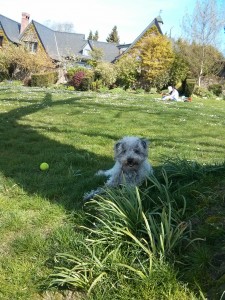Over the course of English 301, I built on various communication techniques, while gaining insight into my own strengths and weaknesses. Practice and peer review processes enhanced my organizational and critical readings skills, which themselves deepen my awareness of communicative processes, composition, and reception.
In doing assignments, my “writing itch” served as a strength. Given time and interest, I am keen to sink my pen into written compositions and I enjoy the creativity of communication. Passion and interest serve as critical building blocks in crafting communication and English 301 provided the parchment for my ink.

Writing assistant, always a key contributor in the process
An inclination for writing extends to my learning tendencies in the realm, where hands-on work elucidates my strengths and shortcomings. The research project was a good example of this learning. While parts of the project were new mediums for me, writing, editing, and re-writing helped strengthen my capabilities in those areas. As a result, I feel increasingly comfortable scoping, organizing, and composing such research projects. While organization used to be my main focus, I’ve recently thought more about improving specific survey questions and techniques in the future, signifying my increased comfort level with this written medium.
I’ve also really appreciated the opportunities to learn from my peers. During the semester, comments from peers and evaluators helped elucidate my writing and style, heightening my awareness and contributing to communication abilities. Specifically, recommendations to vary my sentence length and tweak certain word choices helped shed light on the reception of my writing and I feel that utilizing these suggestions has made my writing smoother and more readable.
In observing my peers, I’ve also learned techniques for presenting and organizing information more effectively. Organizational strategies for creating consistent, coherent themes stand out and I’ve tried to build on and reflect these strategies progressively. My group mates used such approaches well in their application packages and research projects and it seems like a relevant approach to various forms of communication going forward.
Relatedly, English 301 has helped highlight aspects of my writing ripe for improvement. As demonstrated in my assignments, working on techniques to write with a concise “you” attitude will continue to strengthen my writing. Similarly, practicing the balance between casual and professional tones will help to harness a personable, professional, approachable style in my writing.
Increasing and augmenting my use of visuals might also benefit my communication skills. One of my group mates did this exceptionally well, using relevant pictures and diagrams to not only illustrate key points, but also supplement understandings of these points and enhance communication overall. Despite improving in this area over the semester, I still haven’t quite mastered the art of adeptly identifying and displaying pertinent information.
And despite my propensity for hands-on learning, it might also serve me well to work on learning through reading and observation. While hands-on learning is effective, balancing and supplementing myriad learning styles helps to amplify learning overall.
Honing my communication and learning abilities will remain a focus going forward. Communication is often critical to professional success and I believe a heightened awareness of complexities lends to communicative excellence in the professional world. Deft communicators relate to others well, ask effective questions, and provide positive and constructive feedback, and I expect to continue practicing these tenants in school and beyond.
Interaction skills extend to receiving communication, as well. From reading others’ writing to active listening, the ability to glean key messages lies at the heart of effective communication. As usual, this skill necessitates practice and the peer review process provided opportunities to gauge and grow this ability.
